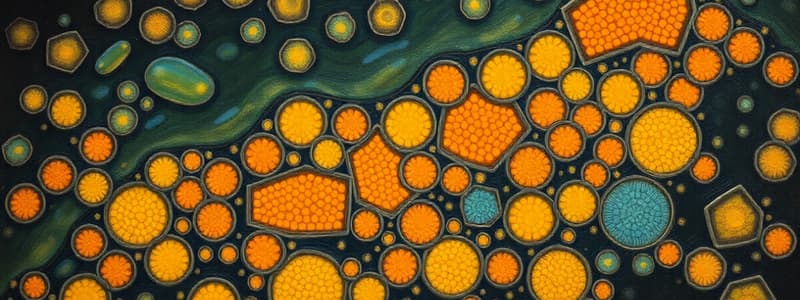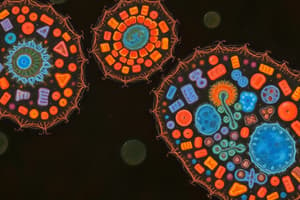Podcast
Questions and Answers
What mechanism is used by organelles to import proteins?
What mechanism is used by organelles to import proteins?
- Fusion with the plasma membrane
- Endocytosis only
- Passive diffusion
- Three mechanisms (correct)
Proteins with a signal sequence are directed to the wrong organelle.
Proteins with a signal sequence are directed to the wrong organelle.
False (B)
What feature is commonly found in signal sequences for organelle targeting?
What feature is commonly found in signal sequences for organelle targeting?
Rich in hydrophobic amino acids
Proteins that lack a signal sequence are typically ________.
Proteins that lack a signal sequence are typically ________.
Match the following protein signal sequences with their corresponding features:
Match the following protein signal sequences with their corresponding features:
What is the primary function of nuclear pores?
What is the primary function of nuclear pores?
Proteins can only enter the nucleus when they are in their unfolded state.
Proteins can only enter the nucleus when they are in their unfolded state.
What does NLS stand for and what is its role?
What does NLS stand for and what is its role?
Small proteins and molecules can pass through nuclear pores by ________.
Small proteins and molecules can pass through nuclear pores by ________.
What drives the nuclear transport cycle?
What drives the nuclear transport cycle?
Match the following with their descriptions:
Match the following with their descriptions:
Nuclear export operates in a manner similar to nuclear import.
Nuclear export operates in a manner similar to nuclear import.
What is the size threshold for proteins to require active transport through nuclear pores?
What is the size threshold for proteins to require active transport through nuclear pores?
Which process is involved in the nuclear import of NFκB during an infection?
Which process is involved in the nuclear import of NFκB during an infection?
The endosymbiont genome is enhanced through gene transfer from the host organism.
The endosymbiont genome is enhanced through gene transfer from the host organism.
What is the function of NFκB in response to infection?
What is the function of NFκB in response to infection?
The cellular stress signal that dictates the nuclear localization of NFκB is _____.
The cellular stress signal that dictates the nuclear localization of NFκB is _____.
What would result in decreased nuclear localization of NFκB after interleukin stimulation?
What would result in decreased nuclear localization of NFκB after interleukin stimulation?
What is the main role of the import receptor (R) in peroxisome protein import?
What is the main role of the import receptor (R) in peroxisome protein import?
Mitochondrial precursor proteins are folded during import.
Mitochondrial precursor proteins are folded during import.
What type of helix is the signal sequence for mitochondrial import?
What type of helix is the signal sequence for mitochondrial import?
Catalase cannot be located in cells that lack peroxisomes.
Catalase cannot be located in cells that lack peroxisomes.
Match the protein transport components to their respective functions:
Match the protein transport components to their respective functions:
What is observed when catalase is detected in normal cells using fluorescent microscopy?
What is observed when catalase is detected in normal cells using fluorescent microscopy?
The import of soluble proteins into peroxisomes requires _____ hydrolysis by a complex in the peroxisome membrane.
The import of soluble proteins into peroxisomes requires _____ hydrolysis by a complex in the peroxisome membrane.
Match the processes with their respective features:
Match the processes with their respective features:
What is the main function of the TOM complex?
What is the main function of the TOM complex?
Changing hydrophobic amino acids in a mitochondrial signal sequence to other hydrophobic amino acids will affect the protein's import into the mitochondria.
Changing hydrophobic amino acids in a mitochondrial signal sequence to other hydrophobic amino acids will affect the protein's import into the mitochondria.
What role does TIM22 play in mitochondrial protein import?
What role does TIM22 play in mitochondrial protein import?
Mitochondrial proteins are imported via the _______ and _______ complexes.
Mitochondrial proteins are imported via the _______ and _______ complexes.
What is a consequence of adding a mitochondrial signal sequence to the amino-terminal end of a normally cytosolic protein?
What is a consequence of adding a mitochondrial signal sequence to the amino-terminal end of a normally cytosolic protein?
Peroxisomes solely rely on the mitochondria for their protein import.
Peroxisomes solely rely on the mitochondria for their protein import.
What is produced during oxidation reactions in peroxisomes?
What is produced during oxidation reactions in peroxisomes?
Match the following terms with their functions:
Match the following terms with their functions:
Flashcards
Protein Sorting
Protein Sorting
The process where proteins are delivered to the correct organelles within a eukaryotic cell.
Signal Sequence
Signal Sequence
A short amino acid sequence within a protein that acts as an address label, directing the protein to the correct organelle.
Organelle Import
Organelle Import
The mechanism by which proteins are transported into different organelles like the nucleus, mitochondria, and peroxisomes.
Protein Destinations in Eukaryotic Cells
Protein Destinations in Eukaryotic Cells
Signup and view all the flashcards
Signal Sequence Features
Signal Sequence Features
Signup and view all the flashcards
Nuclear Pore Function
Nuclear Pore Function
Signup and view all the flashcards
Nuclear Localization Signal (NLS)
Nuclear Localization Signal (NLS)
Signup and view all the flashcards
Size Exclusion Transport
Size Exclusion Transport
Signup and view all the flashcards
Active Transport of Proteins
Active Transport of Proteins
Signup and view all the flashcards
Ran-GTP/GDP Cycle
Ran-GTP/GDP Cycle
Signup and view all the flashcards
Nuclear Import Cycle
Nuclear Import Cycle
Signup and view all the flashcards
Nuclear Import Receptors
Nuclear Import Receptors
Signup and view all the flashcards
Nuclear Export
Nuclear Export
Signup and view all the flashcards
Mitochondrial Protein Import
Mitochondrial Protein Import
Signup and view all the flashcards
TOM Complex
TOM Complex
Signup and view all the flashcards
TIM Complex
TIM Complex
Signup and view all the flashcards
Peroxisome Function
Peroxisome Function
Signup and view all the flashcards
Peroxisome Structure
Peroxisome Structure
Signup and view all the flashcards
Catalase Role
Catalase Role
Signup and view all the flashcards
Protein Import Energy
Protein Import Energy
Signup and view all the flashcards
Nuclear Export Signal (NES)
Nuclear Export Signal (NES)
Signup and view all the flashcards
NF-κB regulation
NF-κB regulation
Signup and view all the flashcards
Mitochondrial import signal sequence characteristics
Mitochondrial import signal sequence characteristics
Signup and view all the flashcards
Protein translocation across membranes
Protein translocation across membranes
Signup and view all the flashcards
Protein Entry Point (Mitochondria)
Protein Entry Point (Mitochondria)
Signup and view all the flashcards
Peroxisome protein import
Peroxisome protein import
Signup and view all the flashcards
Peroxisome import receptor (R)
Peroxisome import receptor (R)
Signup and view all the flashcards
Catalase location (no peroxisomes)
Catalase location (no peroxisomes)
Signup and view all the flashcards
Catalase fluorescence in normal cells
Catalase fluorescence in normal cells
Signup and view all the flashcards
Co-translational import into ER
Co-translational import into ER
Signup and view all the flashcards
Study Notes
Protein Sorting I
- Eukaryotic cells are complex with many membrane-bound compartments
- Organelles include: nucleus, mitochondria, chloroplasts, endoplasmic reticulum, Golgi apparatus, lysosomes, endosomes and peroxisomes
- These compartments have different functions.
- Proteins are targeted to specific organelles.
- Intracellular compartment percentages:
- Cytosol - 54%
- Mitochondria - 22%
- Endoplasmic reticulum - 12%
- Nucleus - 6%
- Golgi apparatus - 3%
- Peroxisomes - 1%
- Lysosomes - 1%
- Endosomes - 1%
Protein Delivery Mechanisms
- Organelles import proteins via three mechanisms:
- Transport through nuclear pores
- Transport across membranes
- Transport by vesicles
- Proteins destined for specific organelles have specific signals that act like addresses.
Nuclear Import
- Nuclear pores are the only gateways between the nucleus & cytoplasm.
- Proteins pass in their folded state.
- Protein import receptors attach to the NLS and transport the cargo into the nucleus
- Two ways to pass through a pore: diffusion or active transport. Small proteins (<40kDa) and RNA diffuse, while larger proteins use active transport mechanisms
- Protein transport in and out of the nucleus is driven by GTP hydrolysis of Ran-GTP and Ran-GDP
Mitochondrial Import
- Precursor proteins unfold to be imported into mitochondria.
- Import occurs across two mitochondrial membranes via TOM (outer membrane) TIM23 (inner membrane) complexes
- Protein targeting signals (often at the N-terminus) are recognized by receptors in the TOM and TIM complexes.
- The N-terminal Signal peptide is cleaved within the mitochondria.
- The process requires energy (ATP hydrolysis) and involves chaperone proteins to help with unfolding and folding.
Peroxisome Import
- Peroxisomes bud off from the ER as vesicles via fission
- Import of peroxisomal proteins is a process involving signal sequences and receptors.
- SKL sequences are involved in peroxisome targeting, and receptors are involved in binding and transport of cargo into the peroxisome.
- Protein import is in a folded state, similar to nuclear transport in these aspects but unlike mitochondria
- Peroxisomes are involved in oxidation reactions involving H2O2 and catalase.
Studying That Suits You
Use AI to generate personalized quizzes and flashcards to suit your learning preferences.




